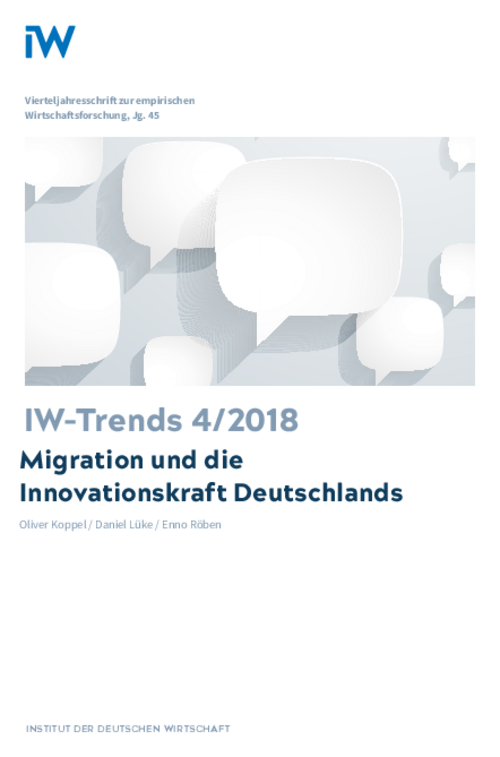This special analysis of the patent database maintained by the German Economic Institute (IW) examines how migration is contributing to Germany's innovative power. A first name database, enabling a socio-demographic analysis of all inventors living in Germany between 2005 and 2016, was developed specifically for this purpose.

The Contribution of Migration to Germany's Innovative Strength
IW-Trends

This special analysis of the patent database maintained by the German Economic Institute (IW) examines how migration is contributing to Germany's innovative power. A first name database, enabling a socio-demographic analysis of all inventors living in Germany between 2005 and 2016, was developed specifically for this purpose.
The results show that migration is making an ever greater contribution to Germany's innovative strength. Measuring full patent equivalents, the proportion of inventors with foreign roots among all inventors resident in Germany rose from 6.1 per cent in 2005 to 9.4 per cent in 2016. A case count measurement confirms these results. In 2016, the number of applications filed in Germany by inventors resident in the country was 4.3 percent higher than in 2005. However, the contribution of inventors from German-speaking countries increased by a relatively low total of 1 percent in the comparison period, while inventors from non-German-speaking countries recorded a rise of something over 65 percent. In particular, inventors from Indian, Chinese and Arabic-Turkish language areas are increasingly contributing to patent applications from Germany. The planned Immigration Act, whose aims include further simplifying immigration procedures from third countries for technicians and scientists, i.e. the core group of potential inventors, would provide a positive impetus for Germany’s innovation system.

Oliver Koppel / Daniel Lüke / Enno Röben: The Contribution of Migration to Germany's Innovative Strength
IW-Trends

More on the topic

Securing skilled workers through immigration to universities
Against the backdrop of demographic change, Germany is increasingly dependent on skilled labour from abroad to secure growth and prosperity.
IW
The Regional Distribution of Graduates in Germany
Graduates in Germany are distributed very unevenly across the country. Taking the population aged between 35 and 44, who have generally already completed their higher education, in 2019 the highest proportions of university graduates were to be found in Berlin ...
IW